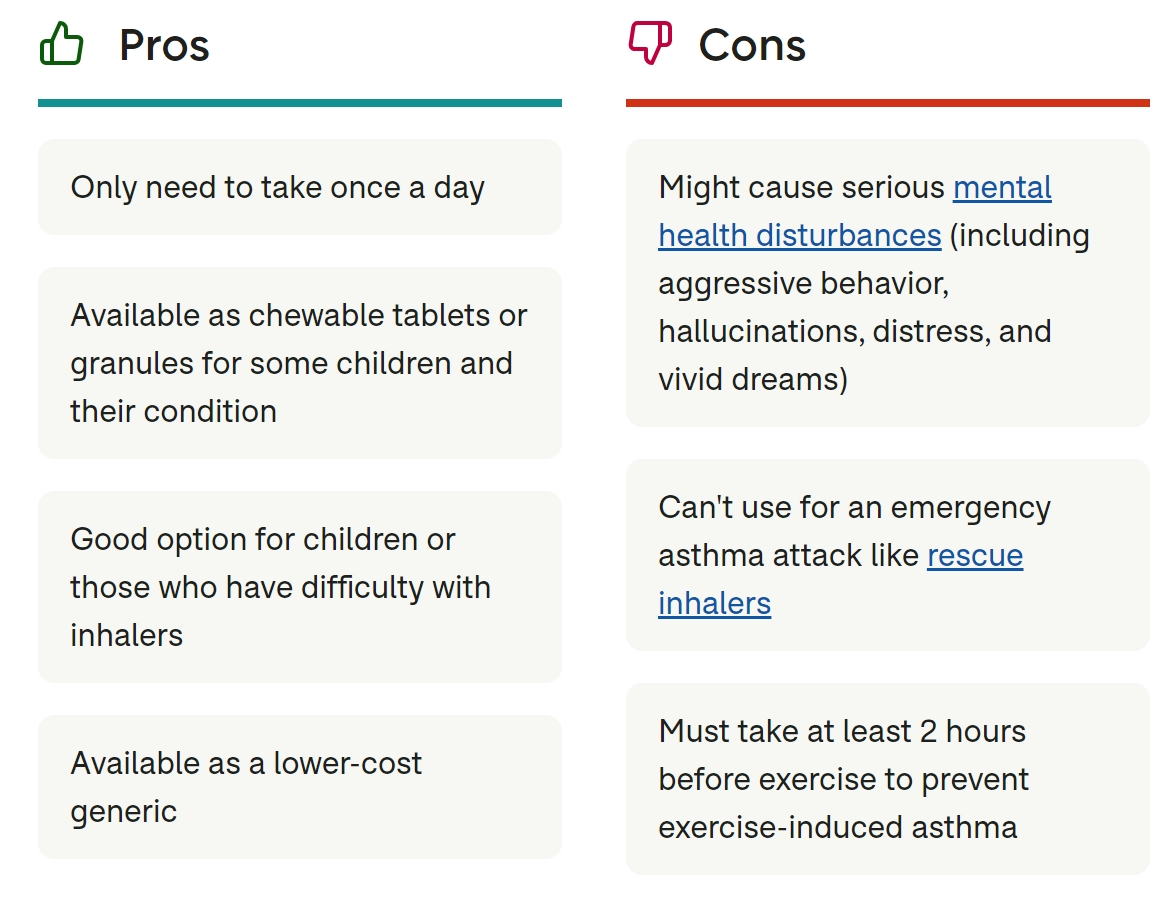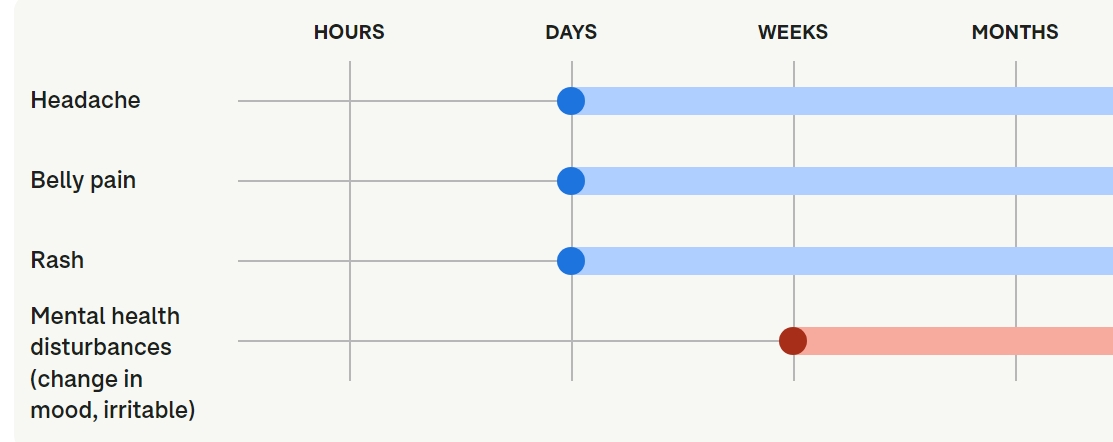Overview
Montelukast (Singulair) is an oral medication used for allergies. It's also used for the long-term treatment of asthma and prevention of exercise-induced asthma. This medication can't be used for a sudden asthma attack, since it takes a longer time to work compared to some inhalers. It's usually an add-on treatment for asthma that might be hard to control.
What is Montelukast (Singulair) used for?
- Seasonal allergies
- Year-round allergies
- Asthma
- Exercise-induced asthma
How Montelukast (Singulair) works
Montelukast (Singulair) is a leukotriene receptor antagonist, meaning it blocks substances in the body called leukotrienes. Leukotrienes can cause inflammation and swelling, and they play a role in causing asthma and allergy symptoms. By blocking leukotrienes, montelukast (Singulair) helps your asthma or allergies.
When does Montelukast (Singulair) start working?
Time passed since treatment started:

Pharmacist tips for Montelukast (Singulair)
- Take montelukast (Singulair) with or without food. Food doesn't affect how this medication works.
- If you're using the granules, you can place them directly in the mouth. You can also dissolve the granules in one teaspoonful of breast milk or baby formula or one spoonful of applesauce, carrots, rice, or ice cream (these are the only foods that the granules have been studied with). Make sure the liquid or foods are cold or at room temperature so the medication works as it should.
- If you miss a dose, skip the missed dose, and take the next dose at your regular time. Don't double up on your dose to make up for a missed dose, since this could lead to side effects.
- Don't stop taking montelukast (Singulair) without speaking to your provider, even if your asthma or year-round allergy symptoms feel better. This medication works to manage these symptoms long term. If your symptoms improve, it's likely because of montelukast (Singulair).
- Call your provider if your asthma is getting worse or if you're needing to use your rescue inhaler more often. They can see if you need a change in your treatment.
- If you're already taking montelukast (Singulair) for asthma or allergies, don't take another dose to prevent exercise-induced asthma. Talk to your provider about other options instead.
- Let your healthcare provider know if you have a condition called phenylketonuria (PKU) so they can prescribe a formulation of montelukast (Singulair) that's safe for you. The chewable tablets contain phenylalanine, which builds up in the body and can lead to serious problems if you have this condition.
What are the risks and warnings for Montelukast (Singulair)?
Montelukast (Singulair) can cause some serious health issues. This risk may be even higher for certain groups. If this worries you, talk to your doctor or pharmacist about other options.
Mental health disturbances
People might have rare behavioral changes while taking montelukast (Singulair). Symptoms range from irritability and memory problems to hallucinations and suicidal thinking. People who haven't had any mental health problems before are at equal risk compared to those who have. If you or those close to you notice any changes in behavior or any of these symptoms, talk to your provider right away.
Not for asthma attacks
Montelukast (Singulair) isn't meant to treat an asthma attack. You should have a fast-acting rescue inhaler with you, especially if you often feel short of breath during exercise. Talk to your healthcare provider if your asthma symptoms don't improve or seem to worsen while taking montelukast (Singulair).
High white blood cell counts
- Risk factors: Possibly related to lowering the dose of corticosteroid medications
Although rare, some people with asthma have developed high eosinophil levels while taking montelukast (Singulair). Eosinophils are a type of white blood cells that help your body respond to allergens. Tell your provider if you notice red patches, rashes, or skin color changes on your lower legs; numbness or tingling; or worsening of your asthma symptoms. This can be a sign of high eosinophil counts, which your provider should evaluate.
Chewable tablets not for people with phenylketonuria (PKU)
- Risk factors: Phenylketonuria (PKU)
Montelukast (Singulair) chewable tablets contain phenylalanine, which is a component of the artificial sweetener ingredient aspartame. Don't take the chewable tablets if you have PKU. PKU is a birth defect that causes phenylalanine to build up in the body, which can lead to serious problems when you ingest phenylalanine.
Strengths
Chewable tablet
- 4mg
- 5mg
Package
- 30 packets of 4mg
Tablet
- 10mg
Dosages
Your dose depends on the formulation of the medication and what you're using it for.
For asthma, montelukast (Singulair) is typically taken in the evening. For exercise-induced asthma, the medication is typically taken at least 2 hours before exercise.
Asthma, exercise-induced asthma, or allergies:
- Adults and children 15 years and older: The typical dose is 10 mg by mouth once daily.
Asthma or allergies:
- Children ages 6 to 14 years old: The typical dose is to chew and swallow 5 mg once daily.
- Children ages 2 to 5 years old: The typical dose is to chew and swallow 4 mg by mouth once daily.
Exercise-induced asthma:
- Children ages 6 to 14 years old: The typical dose is to chew and swallow 5 mg by mouth once daily.
Oral granules: Each packet contains 4 mg of montelukast.
Asthma:
- Children ages 1 to 5 years old: The typical dose is 1 packet by mouth once daily.
Allergies:
- Children ages 2 to 5 years old (seasonal or year-round allergies): The typical dose is 1 packet by mouth once daily.
- Children ages 6 to 23 months old (year-round allergies only): The typical dose is 1 packet by mouth once daily.
Read Related Articles
No related articles found for this product. Read other articles here.
Interactions
Montelukast (Singulair) may interact with certain medications or supplements. Always let your doctor and pharmacist know about any other medications or supplements (including prescribed and over-the-counter medications, vitamins, and dietary or herbal supplements) that you are currently taking. The list below does not include all possible drug interactions with Montelukast (Singulair). Please note that only the generic name of each medication is listed below.
Using this medicine with any of the following medicines is usually not recommended, but may be required in some cases. If both medicines are prescribed together, your doctor may change the dose or how often you use one or both of the medicines.
- Dasabuvir
- Leflunomide
- Pixantrone
- Teriflunomide
Using this medicine with any of the following medicines may cause an increased risk of certain side effects, but using both drugs may be the best treatment for you. If both medicines are prescribed together, your doctor may change the dose or how often you use one or both of the medicines.
Side-effects
The following side effects may get better over time as your body gets used to the medication. Let your healthcare provider know immediately if you continue to experience these symptoms or if they worsen over time.
Common Side Effects
- Headache
- Fever
- Influenza-like symptoms
- Sore throat
- Cough
- Runny nose
- Sinus inflammation
- Belly pain
- Heartburn
- Diarrhea
Other Side Effects
- Nosebleeds
- Fatigue
- Dizziness
- Rash
- Infection (e.g., ear, eye, stomach, lung, common cold)
Serious Side Effects
Contact your healthcare provider immediately if you experience any of the following.
- Mental health disturbances: distress, aggressive behavior, anxiousness, depression, bad or vivid dreams, hallucinations, trouble sleeping, trouble with memory, obsessive-compulsive symptoms, restlessness, suicidal thoughts and behavior
When do Montelukast (Singulair) possible side effects begin and end?
Time passed since treatment started:
The following side effects have also been reported
Along with its needed effects, a medicine may cause some unwanted effects. Although not all of these side effects may occur, if they do occur they may need medical attention.
Check with your doctor immediately if any of the following side effects occur:
More common
- Body aches or pain
- Cough
- Difficulty in breathing
- Dryness or soreness of the throat
- Fever
- Headache
- Loss of voice
- Pain or tenderness around the eyes and cheekbones
- Pain, redness, or swelling in the ear
- Stomach pain
- Stuffy or runny nose
- Tender, swollen glands in neck
- Trouble in swallowing
- Unusual tiredness or weakness
- Voice changes
Less common
- Bloody nose
- General feeling of discomfort or illness
- Joint pain
- Sweating
Rare
- Pus in the urine
- Incidence not known
- Agitation
- Anxiety
- Attempts at killing oneself
- Breathing problems
- Confusion about identity, place, and time
- Constipation
- Fast, irregular, pounding, or racing heartbeat or pulse
- Feeling sad or empty
- Hives or welts
- Indigestion
- Itching, puffiness, or swelling of the eyelids or around the eyes, face, lips, or tongue
- Lack of appetite
- Pains in the stomach, side, or abdomen, possibly moving to the back
- Redness of the skin
- Shaking or trembling of the hands or feet
- Trouble with concentrating
- Unable to sleep
- Unpleasant breath odor
- Vomiting of blood
- Yellow eyes or skin
Some side effects may occur that usually do not need medical attention. These side effects may go away during treatment as your body adjusts to the medicine. Also, your health care professional may be able to tell you about ways to prevent or reduce some of these side effects. Check with your health care professional if any of the following side effects continue or are bothersome or if you have any questions about them:
More common
Less common
- Acid or sour stomach
- Belching
- Blurred vision
- Change in near or distance vision
- Dental pain
- Heartburn
- Lack or loss of strength
- Pain
- Skin rash, encrusted, scaly and oozing
- Stomach discomfort, upset, or pain
Incidence not known
- Burning, crawling, itching, numbness, prickling, “pins and needles”, or tingling feelings
- Dreams that are unusual
- Increased tendency to bleed
- Large, flat, blue or purplish patches on the skin
- Muscle aching or cramping
- Sleepiness
- Swollen joints
Common Concerns
Feedback from Our Clients
Explore feedbacks from our clients below. They reflect the dedication and expertise we bring to every interaction, and how our services have positively impacted their health.
